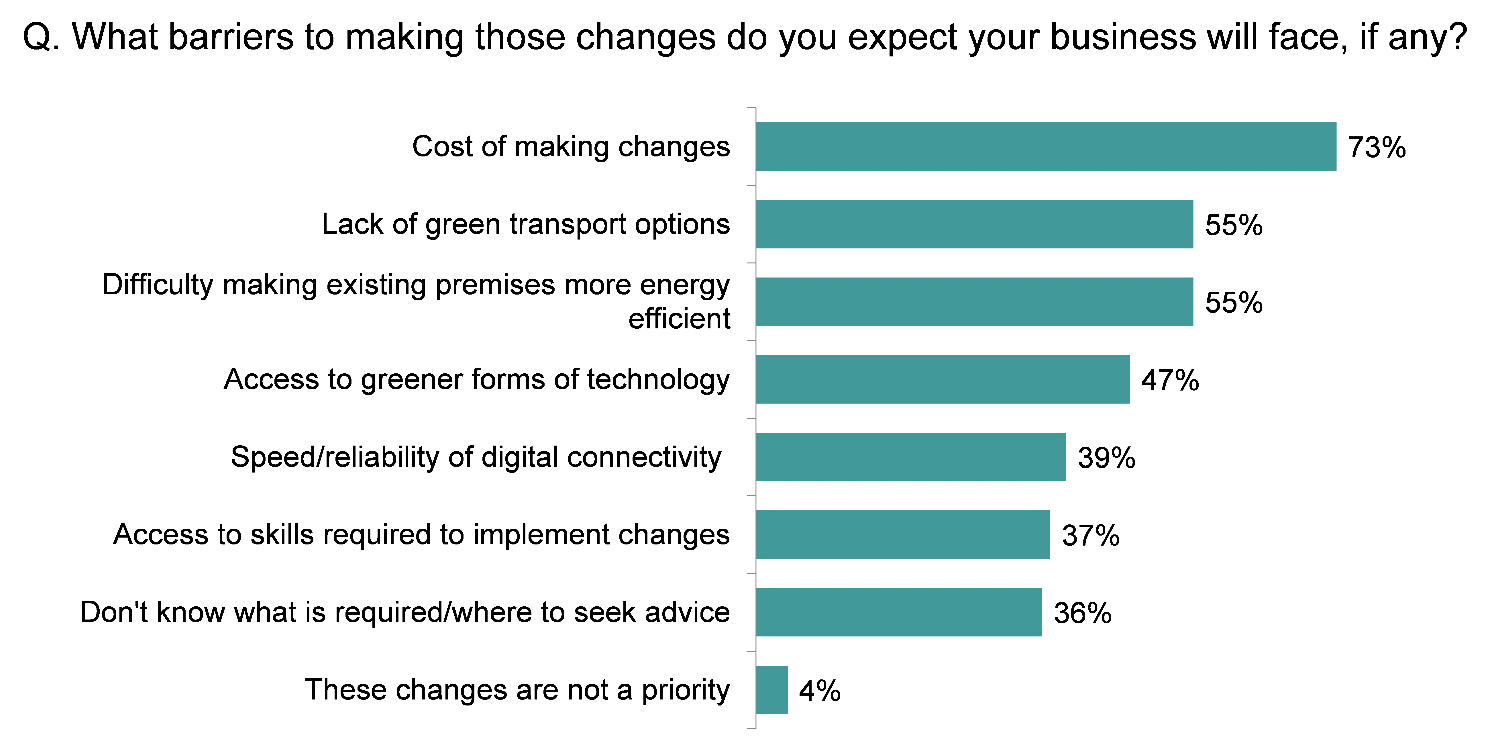Rural Scotland Business Panel survey: report
This report presents findings from the first Rural Scotland Business Panel survey carried out in October/November 2021.
8. Net zero
Key findings
The vast majority (93%) of businesses were currently taking some action(s) to reduce their greenhouse gas emissions. The top three actions were: recycling and minimising waste (89%), using more locally sourced supplies (69%) and improving energy efficiency of premises (48%).
Actions that businesses were more likely to say they did not plan on taking were: reusing materials or waste from other businesses (49% not planning to), measuring their emissions (49%), reviewing transport for supplies or distribution (41%) and offsetting carbon emissions (41%).
The most frequently mentioned barriers to reducing greenhouse gas emissions were: cost of making changes (73%), lack of green transport options (55%) and difficulty making existing premises more energy efficient (55%).
Actions to reduce emissions
The vast majority (93%) of businesses were currently taking some action(s) to reduce their greenhouse gas emissions.
The most common actions businesses were taking or planning to take were those that arguably might require the least significant changes to the way businesses operate. The top three actions were: recycling and minimising waste (89%), using more locally sourced supplies (69%) and improving energy efficiency of premises (48%) (Figure 8.1).
Actions that businesses were more likely to say they did not plan on taking were: reusing materials or waste from other businesses (49% not planning to), measuring their emissions (49%), reviewing transport for supplies or distribution (41%) and offsetting carbon emissions (41%).

Base: All buisinesses for whom it applied
Variation in actions to reduce emissions
By sector, businesses more likely to currently be taking specific actions to reduce emissions were:
- Food and drink – using more locally sourced supplies (75%), improving energy efficiency of premises (53%) and processes (49%), using renewable energy sources (46%), reusing waste or material from other businesses (42%), offsetting carbon emissions (29%) and measuring emissions (28%).
- Tourism – using more locally sourced supplies (82%), improving energy efficiency of premises (57%) and processes (53%).
- Creative industries – recycling and minimising waste (95%), improving energy efficiency of processes (53%), reusing waste or material from other businesses (49%), reducing staff travel or using greener transport (46%).
- Financial and business services – reducing staff travel or using greener transport (46%).
Businesses in remote rural areas were also more likely to be currently taking the following actions:
- using more locally sourced supplies (75%),
- improving energy efficiency of premises (52%) and processes (51%),
- reusing waste or material from other businesses (42%),
- using renewable energy (43%),
- offsetting carbon emissions (26%), and
- measuring emissions (21%).
Barriers faced when reducing emissions
The most frequently mentioned barriers to reducing greenhouse gas emissions were: cost of making changes (73%), lack of green transport options (55%) and difficulty making existing premises more energy efficient (55%) (Figure 8.2).

Base: All businesses expecting to make changes (1,949)
Variation in barriers to reducing emissions
The following were more likely than average to be facing specific barriers in terms of reducing emissions:
- Tourism – difficulty making existing premises more energy efficient (70%) and not knowing what is required/ where to seek advice (47%).
- Food and drink – cost of making changes (78%) and access to greener forms of technology (52%).
- Remote rural – lack of green transport options (61%), speed/ reliability of digital connectivity (45%), and access to skills required to implement changes (41%).
Contact
Email: socialresearch@gov.scot
There is a problem
Thanks for your feedback